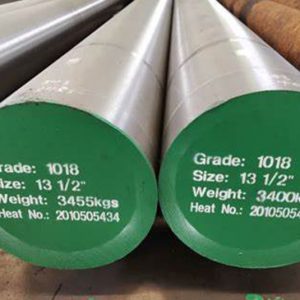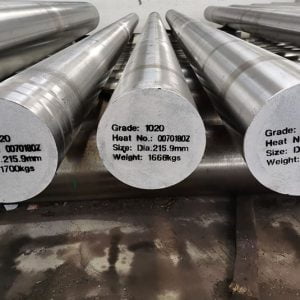Introducción

Carbon steel, known for its strength and affordability, is a crucial material in numerous industrial applications. Among its various grades, 1020 carbon steel stands out due to its specific composition and properties that make it suitable for a wide range of uses. In this blog, we will delve into the key uses and industries where 1020 carbon steel plays a vital role.
Properties of 1020 Carbon Steel
To understand its applications better, let’s first explore the properties that define 1020 carbon steel:
- Composición: 1020 carbon steel typically contains about 0.20% carbon and small amounts of manganese (0.60-0.90%) and sometimes silicon. This composition provides a balance of strength, ductility, and machinability.
- Strength and Ductility: It offers good strength and ductility, making it suitable for applications that require both resilience and formability.
- Machinability: 1020 steel is easily machined, allowing for intricate shapes and precise finishes.
- Soldabilidad: It welds easily and can be joined to other materials efficiently.
- Versatilidad: Its versatility allows it to be used in various manufacturing processes, from simple bending to complex machining operations.
Key Uses of 1020 Carbon Steel
Manufacturing of Automotive Parts
The automotive industry is a significant user of 1020 carbon steel due to its combination of strength, formability, and affordability. It finds applications in:
| Component | Aplicación |
|---|---|
| Axles | Axles made from 1020 steel provide the necessary strength and durability for bearing vehicle weight and handling stress. |
| Suspension parts | Components like springs and shock absorbers benefit from 1020 steel’s ability to absorb impact and resist deformation. |
| Chassis components | The chassis frame made from 1020 steel offers structural integrity and rigidity, ensuring vehicle safety and performance. |
| Fasteners and bolts | Fasteners made from 1020 steel provide secure assembly due to their strength and resistance to shear forces. |
Machinery and Equipment
In industrial machinery and equipment, 1020 carbon steel is chosen for:
| Component | Aplicación |
|---|---|
| Shafts and gears | Shafts and gears made from 1020 steel are known for their strength, durability, and resistance to wear, making them ideal for transmitting power and motion. |
| Bearings | Bearings made from 1020 steel exhibit good load-bearing capacity and durability under high-speed rotation and heavy loads. |
| Hydraulic cylinders | Hydraulic cylinders benefit from 1020 steel’s machinability and weldability, allowing for efficient manufacturing of reliable hydraulic systems. |
| Cutting tools | Cutting tools made from 1020 steel maintain sharpness and durability during machining operations, enhancing productivity and precision. |
Industria de la construcción
In the construction sector, 1020 carbon steel is used for:
| Aplicación | Use |
|---|---|
| Structural beams | Structural beams made from 1020 steel provide essential support in building construction, ensuring stability and load-bearing capacity. |
| Reinforcing bars | Reinforcing bars made from 1020 steel enhance the strength and durability of concrete structures, resisting tension and preventing cracking. |
| Nuts, bolts, and screws | 1020 steel nuts, bolts, and screws are essential for secure fastening in construction projects, ensuring structural integrity and safety. |
| Pipes and tubes | Pipes and tubes made from 1020 steel offer ductility and weldability, making them suitable for conveying fluids and structural applications. |
Industries Using 1020 Carbon Steel
Industria del automóvil
The automotive sector extensively utilizes 1020 carbon steel in:
- Vehicle manufacturing: From body panels to internal components like engine mounts and seat frames.
- Component production: Steering columns, brake components, and transmission parts benefit from 1020 steel’s reliability and cost-effectiveness.
Manufacturing Sector

In general manufacturing, 1020 carbon steel plays a crucial role in:
- Tool and die making: Its machinability allows for the production of precise tools and dies used in various manufacturing processes.
- Machine parts: Bearings, shafts, and gears made from 1020 steel ensure smooth operation and longevity of industrial machinery.
Conclusión
1020 carbon steel’s popularity arises from its balanced properties of strength, machinability, and affordability, making it indispensable across diverse industries. Whether in automotive manufacturing, machinery production, or construction, its reliability and versatility continue to drive its widespread use. Understanding these applications underscores its importance in modern manufacturing and construction sectors.
PREGUNTAS FRECUENTES
Q: What are the main advantages of using 1020 carbon steel?
A: 1020 carbon steel offers a combination of strength, machinability, and affordability, making it suitable for a wide range of applications without compromising on performance.
Q: Is 1020 steel corrosion-resistant?
A: While it provides moderate resistance to corrosion, additional coatings or treatments may be necessary for extended durability in corrosive environments.
Q: How does 1020 carbon steel compare to other carbon steels?
A: Compared to higher carbon steels, 1020 carbon steel is softer and more ductile, which enhances its machinability but may slightly reduce its strength in certain applications.






